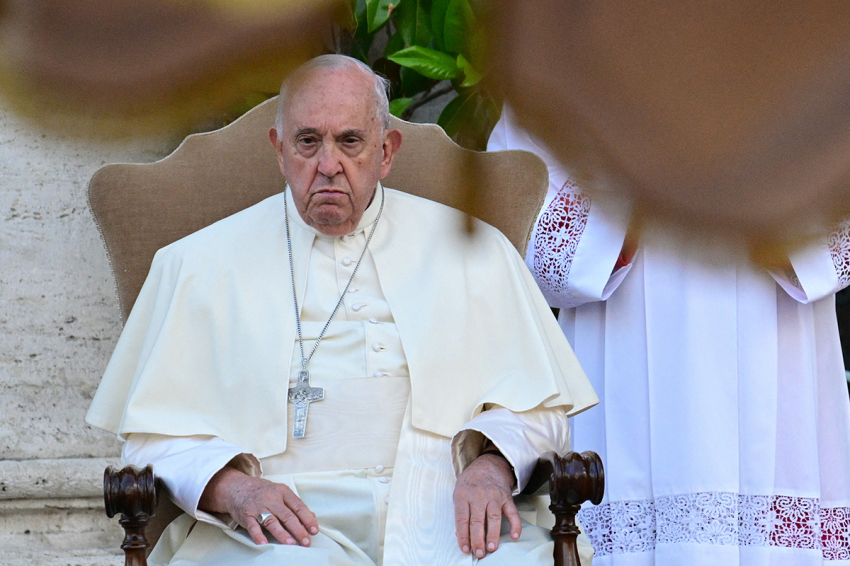Islamic State-linked terrorists plotted to attack Pope Francis during Asia trip

The Indonesian police detained seven terrorist suspects involved in a plot to attack Pope Francis during his 12-day tour of southeast Asia, and some of those arrested reportedly pledged allegiance to the Islamic State terror organization.
Authorities arrested the attackers in Jakarta, in the outlying cities of Bogor and Bekasi, West Sumatra province and Bangka Belitung Islands province, as The Straits Times reported Friday.
Police arrested the suspects mostly on Sept. 2 and 3, and a search of their homes revealed items such as bows and arrows, a drone and IS (also known as ISIS and ISIL) leaflets.
According to Indonesia's national police anti-terrorism squad Detachment-88, the initials of the terrorist suspects are HFP, LB, DF, FA, HS, ER and RS. The investigation is still ongoing. It isn't clear if the detainees knew one another or were part of the same terror cell.
Detachment-88 spokesman Aswin Siregar informed the media that one of those arrested belonged to the same militant group that attacked Wiranto, Indonesia's former Chief Security Minister, in 2019.
Wiranto suffered two stab wounds to the stomach during a visit to western Java in October 2019. The two assailants behind the attack were reportedly members of an IS-affiliated terror group, Jamaah Ansharut Daulah. The assailants behind the attack were a husband and wife who are believed to have been inspired by IS, The New York Times reports.
Regarding the plot against the pope, Siregar said that the militants were angered by Pope Francis' visit to Jakarta's Istiqlal mosque, the largest in southeast Asia. The militants were also reportedly incensed over the government's appeal for television stations to refrain from broadcasting the Islamic call to prayer during a live broadcast of Pope Francis' visit.
Instead of broadcasting the Islamic call to prayer, according to The Straits Times, television stations ran a stream of running text instead.
Pope Francis visited Indonesia for a 12-day trip throughout southeast Asia, including stops in Papua New Guinea, East Timor and Singapore. The trip, Francis's longest yet, is the 45th foreign trip the Catholic leader has taken since his election in March 2013.
As Reuters reported in August, the head of the Catholic Church is taking the trip to urge global action on climate change. Another goal of the trip is creating an inter-faith dialogue between Catholics and Muslims.
Jakarta residents welcomed the pope when he arrived at the Soekarno Hatta International Airport on Sept. 3. One 47-year-old resident, Yohana Victoria, told BBC, "The mere sight of the Pope's hat heals me."
BBC notes that with Pope Francis' visit to Indonesia allowed the country to try and demonstrate that it's a moderate Muslim-majority country even though advocates rank it as one of the world's worst countries for persecution of Christians.
Some still hoped that the pope would address religious persecution in the country and urge the government of Indonesia to do more to stop it.
"Interfaith dialogue has been going on in Indonesia for many years, and many people have been actively involved in that," Matius Ho, executive director of Leimena Institute, a Christian group in Indonesia, told BBC Newsday.
"[The visit] is not simply regional," Chambon added. "It is much more a global statement to reaffirm the universal possibility for Christian-Muslim fraternal engagement."
During his tour, Pope Francis has emphasized the importance of the Catholic Church serving marginalized communities, as CNN reported Sunday. While speaking to church leaders during a visit to Papua New Guinea, the pope told them to focus on the "peripheries of this country" and people in poor urban areas.
According to Human Rights Watch, 1.5 million people experience gender-based violence each year each year in Papua New Guinea, which is considered one of the most dangerous countries for women and girls. Francis appeared to comment on this, stating that the church is committed to helping those wounded "morally and physically" due to "prejudice and superstition."
Samantha Kamman is a reporter for The Christian Post. She can be reached at: samantha.kamman@christianpost.com. Follow her on Twitter: @Samantha_Kamman


























